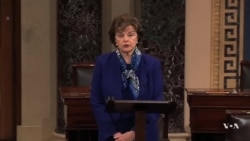WASHINGTON —
The recently-exposed dispute between the U.S. Senate Intelligence Committee and the CIA is causing a stir in Washington. Some analysts say, though, it may not have much impact on U.S. intelligence operations overseas.
"I have grave concerns that the CIA's search may well have violated the separation of powers principles embodied in the United States Constitution," said Senate Intelligence Committee Chairman Dianne Feinstein, who made news recently when she alleged that the CIA had monitored committee staff members who were investigating the agency.
In 2009, the spy agency let the staffers use its computers to review top secret documents on the CIA's interrogation and detention of terror suspects during the George W. Bush administration. The CIA said the employees had taken documents they were not meant to have.
Feinstein said the agency then withdrew access to those documents.
Differing accounts
CIA Director John Brennan denied that any hacking occurred. "I think a lot of people who are claiming that there has been this tremendous sort of spying, monitoring and hacking, will be proved wrong."
President Barack Obama has called for the public release of the committee's classified report on the interrogation program, which lawmakers say details the CIA's use of waterboarding and other harsh techniques during the Iraq and Afghanistan wars.
Professor Henry Farrell, at George Washington University, said that could damage the CIA's image abroad. "But I think, at the very least, we're going to see some embarrassment for the United States, when some of the stuff that the CIA was, in fact, doing in the first years after September 11th are revealed publicly, and that's going to, I think, be quite controversial in other countries," he said.
Farrell said world leaders are not likely to be concerned, however, about the dispute between the Senate and the CIA.
"It's probably not going to have all that much of a disruptive impact, because the people who are cooperating with each other are exactly the kinds of people who are not going to be particularly concerned or fussed about this in the first place," he said.
Strong relationships
Mark Lowenthal agrees. He's a retired intelligence officer and president of the Intelligence and Security Academy.
"All the countries with whom we work know that we have a congressional oversight system, and that certain materials are given to the House and Senate as part of their oversight. So the fact that this is going on is probably not going to be news to anybody, and so I don't think it will affect those relationships."
Lowenthal said the dispute actually may be a good advertisement for the American system of government. "This is how you run a secret intelligence community in a democracy, that there are rules, and there's give-and-take, and that the intelligence community is not just doing things on their own."
Republicans could take the Senate majority in the November election, and with it, chairmanship of the Intelligence Committee. They have shown no signs of wanting to make the report public.
"I have grave concerns that the CIA's search may well have violated the separation of powers principles embodied in the United States Constitution," said Senate Intelligence Committee Chairman Dianne Feinstein, who made news recently when she alleged that the CIA had monitored committee staff members who were investigating the agency.
In 2009, the spy agency let the staffers use its computers to review top secret documents on the CIA's interrogation and detention of terror suspects during the George W. Bush administration. The CIA said the employees had taken documents they were not meant to have.
Feinstein said the agency then withdrew access to those documents.
Differing accounts
CIA Director John Brennan denied that any hacking occurred. "I think a lot of people who are claiming that there has been this tremendous sort of spying, monitoring and hacking, will be proved wrong."
President Barack Obama has called for the public release of the committee's classified report on the interrogation program, which lawmakers say details the CIA's use of waterboarding and other harsh techniques during the Iraq and Afghanistan wars.
Professor Henry Farrell, at George Washington University, said that could damage the CIA's image abroad. "But I think, at the very least, we're going to see some embarrassment for the United States, when some of the stuff that the CIA was, in fact, doing in the first years after September 11th are revealed publicly, and that's going to, I think, be quite controversial in other countries," he said.
Farrell said world leaders are not likely to be concerned, however, about the dispute between the Senate and the CIA.
"It's probably not going to have all that much of a disruptive impact, because the people who are cooperating with each other are exactly the kinds of people who are not going to be particularly concerned or fussed about this in the first place," he said.
Strong relationships
Mark Lowenthal agrees. He's a retired intelligence officer and president of the Intelligence and Security Academy.
"All the countries with whom we work know that we have a congressional oversight system, and that certain materials are given to the House and Senate as part of their oversight. So the fact that this is going on is probably not going to be news to anybody, and so I don't think it will affect those relationships."
Lowenthal said the dispute actually may be a good advertisement for the American system of government. "This is how you run a secret intelligence community in a democracy, that there are rules, and there's give-and-take, and that the intelligence community is not just doing things on their own."
Republicans could take the Senate majority in the November election, and with it, chairmanship of the Intelligence Committee. They have shown no signs of wanting to make the report public.





